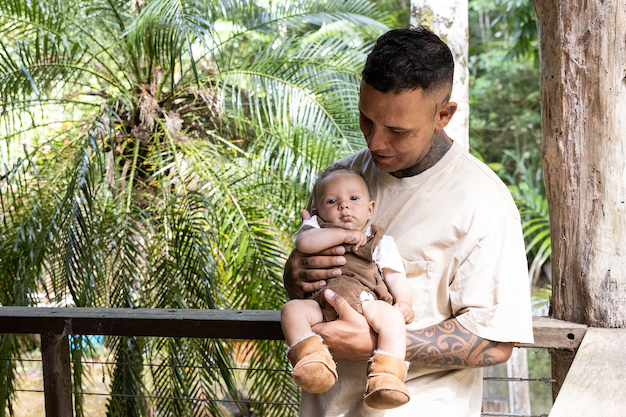

SMS4dads is a multi-layered service. It has been designed to be easy-to-opt in and easy to opt-out. It is a non-obtrusive service that provides relevant information to dads where they need it – when they need it.
SMS4dads is not only for well dads who say they’re doing pretty well (even amidst the challenges of parenthood!), but it also provides some extra support for dads who may be doing it tough.
Dads and their partners who experience the loss of a baby through miscarriage or stillbirth, dads and their partners with mental health concerns, and Aboriginal and Torres Strait Islander dads are sent tailor made messages to support them through their unique experiences.
We’ve listed below some answers to frequently asked questions. If you have other questions, feel free to GET IN TOUCH
Any dad or partner of a mum who is pregnant, or any dad (or someone who is in the role of the dad) of a baby less than 12 months of age.
It’s easy. Click here to JOIN UP. All you need to do is:
…and you’re in.
You’ll receive three types of messages:
“Although it’s noisy in here, I will be able to hear your voice from about 20 weeks. Try telling me about the things we will do together.”
“If you’re both up for it, then there’s usually no problem with having sex during pregnancy. It will not harm the baby. Visit this LINK for more info.”
Approximately every three weeks a ‘How’s it going?” interactive text is sent timed for common challenges such as baby crying or work-family balance. Dads can reply with a click and be directed to online help or more information.
Messages can start from 12 weeks into the pregnancy up until your baby turns one.
Once registered, you receive about three messages a week.
The messages are timed to match the development of your unborn or recently born baby So, you get messages to suit the age and stage of your baby’s development. For example, if you sign up one week before the birth of your bub your messages are synced to that stage of pregnancy. If your baby is two months old, your messages will be for that age.
You just have to simply text back ‘STOP’ to any message, and we take you out of the program.
There are no follow up offers or messages asking you ‘Are you sure you want to leave?’ Just one text asking you to give a reason.
It will say:
Thanks for being part of SMS4dads. Your messages have been stopped. Do you want to tell us why you are stopping?
1 = not helpful
2 = I did not sign up for this
3 = situation has changed
4 = too busy
5 = other reasons
And that is all
About every three weeks you will receive an interactive text with a question about how you are going with one of the common challenges such as:
The idea is to take a few moments to check in with how you are doing and maybe get some info or help. Mood Checker text messages often have links to online resources if you are interested.
There are countless programs marketed for ‘parents’ or ‘families’. Often these programs don’t necessarily talk with fathers. If fathers do join up for parenting programs, they often drop out as they are focused on the needs and experiences of mothers.
We want to reach dads. SMS4dads is designed specifically to support new fathers to:
SMS4dads is free. It provides info for dads – when they need it, where they need it
THEY CERTAINLY ARE!
As one mum said: “It helped my partner to feel part of the ‘baby process’, and that his experiences were also important. This made for a more cohesive family unit. The messages gave us both confidence and helped to avoid fights when extreme fatigue set in”
Mums play a significant role and influence on whether dads join up. If you’re a mum and you think your partner might find SMS4dads a helpful source of info and support, you can encourage him to sign up.
If you need help now there are services, information and support you access here. This page provides info about a range of areas where you may need help.

Richard’s research revealed possible long-term negative impacts on the children of dads with mental health issues. Fathers’ depressive symptoms in the first year after the birth predicted behaviour problems in their children years later.
“If dads’ mental health has such a dramatic impact then we need to be screening dads for depression, not just mums,” Richard explains.
In response to these limitations, Richard and his team have designed a smart-phone based program that allows mobile connection for new and expectant dads.
Participants receive texts containing information and links, and self-report their mood. If the mood tracker identifies dads as needing extra support, they will be offered a phone call from a counsellor trained in this area.
Following the success of the pilot of the SMS4dads program, Funding was received to enable a National roll-out.
“When dad’s miss antenatal classes or activities, they also miss out on contact and links to other people. They may never get the chance to say to anyone, look I’m really stressed,” he points out.
“SMS4dads is a way of bringing dads into the health system and keeping them linked in with services and support,” explains Richard.
Richard credits a varied career, a talented and innovative team, and much life experience for affording him the insight needed to address the challenges related to actively engaging dads.
After completing his masters in Medical Science, studying epidemiology, Richard earned his PhD focusing on fathers and attachment.
“Fathers are invisible in many places, and that is endemic. Not because people dislike fathers, but because the system is set up to be focused on mothers.”
Some services and organisations are aware of the need to engage dads, but have been unsuccessful in their attempts.
“When people are challenged about this, they generally want dads involved,” Richard affirms.
“Often, however, they just don’t know how to do it.”
Richard works with health professionals on issues related to fathers, and has delivered many antenatal programs for expectant dads.
He credits his own family with giving him an understanding of the role of fathers needed to make his work relevant.
“I have three daughters and two stepdaughters,”
“My kids would say they taught me just about everything I know and they’d be right. They’ve taught me a lot, and still do.”
Richard’s research revealed possible long-term negative impacts on the children of dads with mental health issues. Fathers’ depressive symptoms in the first year after the birth predicted behaviour problems in their children years later.
“If dads’ mental health has such a dramatic impact then we need to be screening dads for depression, not just mums,” Richard explains.
In response to these limitations, Richard and his team have designed a smart-phone based program that allows mobile connection for new and expectant dads.
Participants receive texts containing information and links, and self-report their mood. If the mood tracker identifies dads as needing extra support, they will be offered a phone call from a counsellor trained in this area.
Following the success of the pilot of the SMS4dads program, Funding was received to enable a National roll-out.
“When dad’s miss antenatal classes or activities, they also miss out on contact and links to other people. They may never get the chance to say to anyone, look I’m really stressed,” he points out.
“SMS4dads is a way of bringing dads into the health system and keeping them linked in with services and support,” explains Richard.